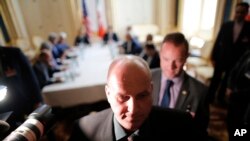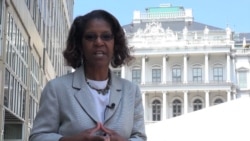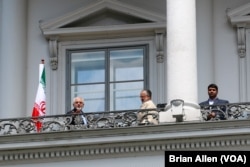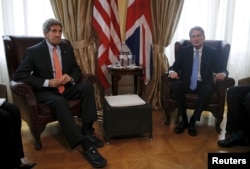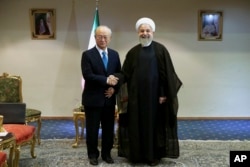Iranian negotiators in Vienna are sending mixed signals about the pace of talks with Western powers on the country's nuclear program.
British Foreign Secretary Philip Hammond said negotiators were "not at any kind of breakthrough moment yet."
"The work goes on," said Hammond as he spoke to reporters outside of the negotiation site.
"The open question," said German Foreign Minister Frank-Walter Steinmeier, "is whether the will and courage will be sufficient among all at the end."
WATCH: Pam Dockins reports from Vienna
French Foreign Minister Laurent Fabius arrived at the negotiating site later in the day, saying “progress had been made on some points, but not yet on others.”
Earlier Thursday, Iranian Foreign Minister Mohammad Javad Zarif stood on the balcony of the ornate Palais Coburg negotiating site. He smiled broadly and waved to reporters. Asked about the talks, he said, "I have to be hopeful."
Speaking on the sidelines of talks, however, Iranian Deputy Foreign Minister Majid Takht-e Ravanchi took a hard line on sanctions relief.
Iranian state media report he said, "We expect all economic, trade and financial sanctions to be terminated from the implementation day."
Several Iranian officials have indicated they favor an immediate lifting of sanctions in exchange for an agreement that would restrict the country's ability to produce nuclear weapons. World powers negotiating with Iran favor phased sanctions relief.
Full day of talks for foreign ministers
On Wednesday, U.S. Secretary of State John Kerry said negotiators were "working very, very hard" and had encountered some "very difficult issues."
Kerry has a full schedule on Thursday that includes talks with Zarif, the foreign ministers of the United Kingdom and China, the EU foreign policy chief, and the foreign ministers of France, Germany and Britain, the so-called E3.
Zarif, meanwhile, is consulting with officials, including Germany’s delegation.
IAEA chief seeks progress in Tehran
Meanwhile, the head of the U.N.'s nuclear watchdog organization met with Iranian officials in Tehran on Thursday in the latest effort to resolve longstanding questions about Iran's nuclear program.
International Atomic Energy Agency (IAEA) chief Yukiya Amano held talks with officials, including the secretary of Iran's Supreme National Security Council, Ali Shamkhani.
The IAEA said officials would discuss how to more quickly resolve outstanding issues, including "clarification of possible military dimensions" of Iran's nuclear activity. Iran has long denied working to develop nuclear weapons.
The IAEA has tried for years to get answers in its probe, including having U.N. inspectors visit the Parchin military site, but has faced resistance from Iran.
Analyst: work beyond July 7 OK
Iran and the world powers involved in talks agreed on a framework deal in April and were supposed to have a final, comprehensive plan by last Tuesday; however, they agreed to move their deadline to July 7.
“I don’t think it is necessarily the case that this all falls apart by July 7th, July 9th, July 14th let alone by even August or September,” said Richard Nephew of the Center on Global Energy Policy.
“It depends if both sides are willing to let the Joint Plan of Action stay and if they are, then I think we have got lots of time,” he said.
An agreement between Iran and the so-called P5+1 powers — the U.S., Russia, China, Britain, France and Germany — would end almost two years of tough negotiations between the two sides.




